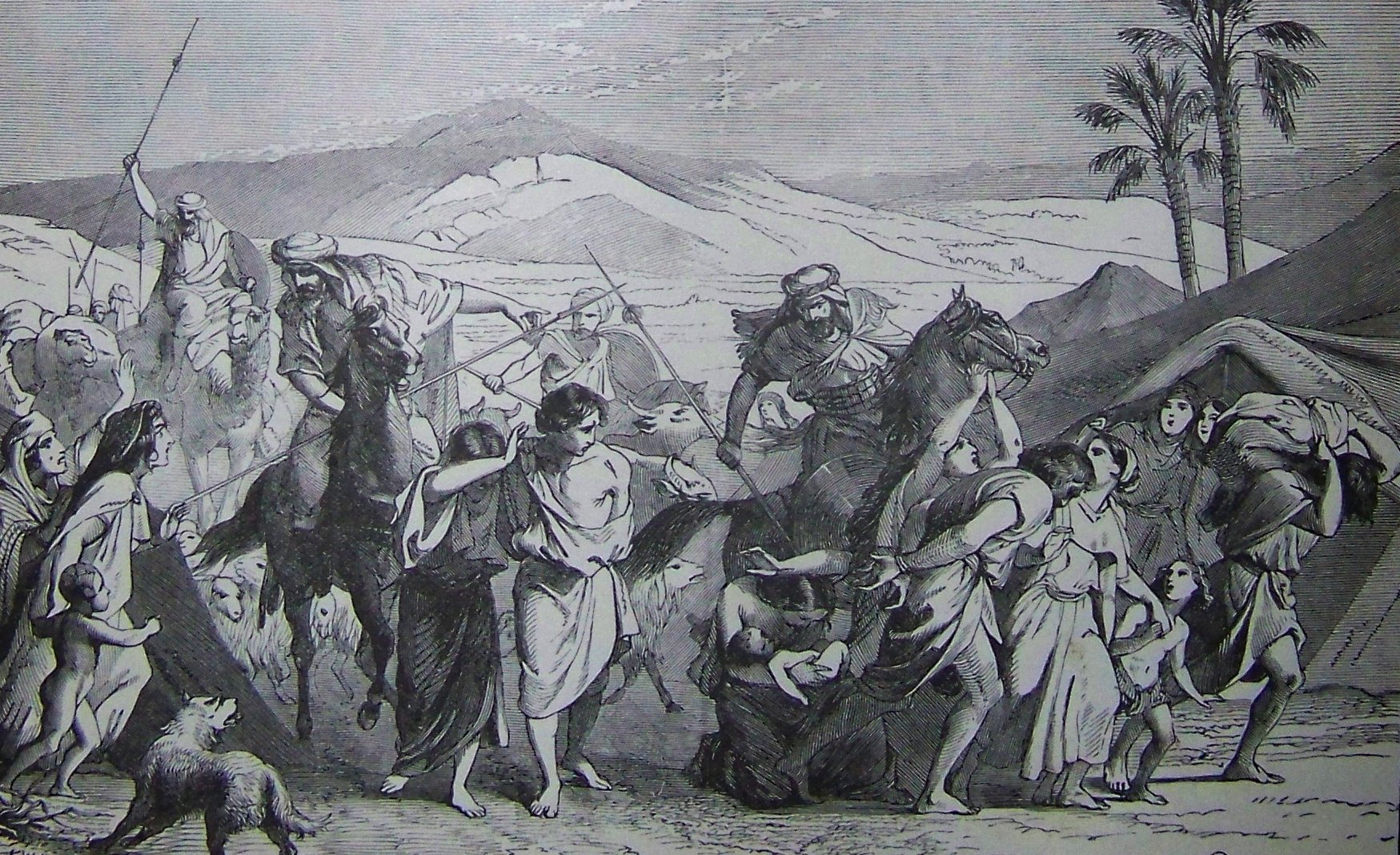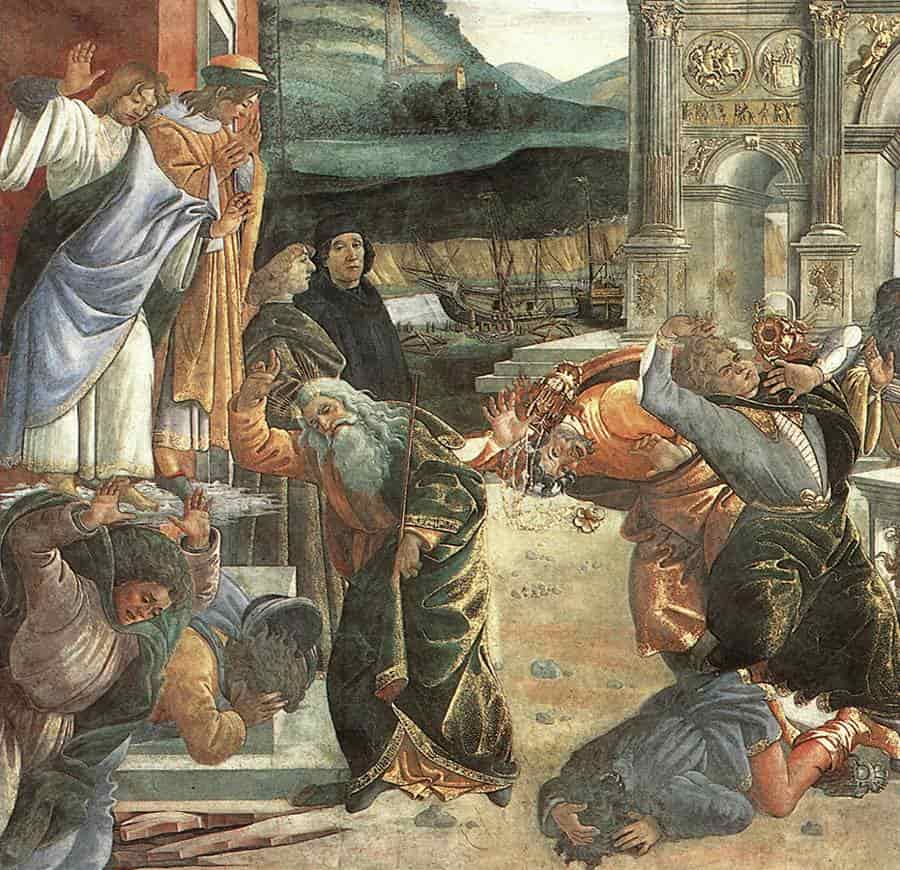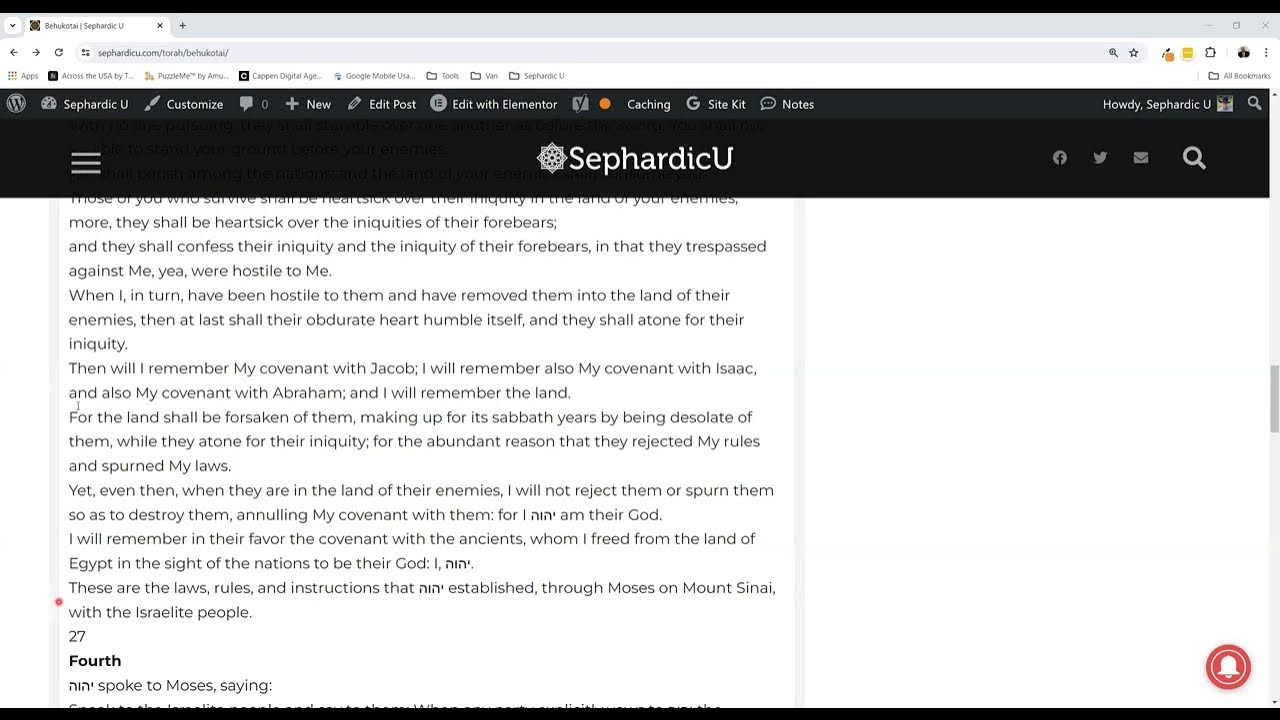| Aspect | Description |
|---|---|
| Parasha Number | The 33rd Parasha in the Book of Leviticus (Vayikra). |
| Parasha Name | Behukotai (בְּחֻקֹּתַי), translating to “In My statutes” in Hebrew, referring to God’s commandments given to the Israelites. |
| Torah Book | Leviticus (Vayikra). |
| Number of Verses | Comprises 78 verses. |
| Number of Words | Approximately 1,420 words in the Hebrew text. |
| Primary Characters | Key figures include Moses and the Israelites, with God communicating the blessings for obedience and the consequences for disobedience to His commandments. |
| Key Themes | Focuses on the blessings for following God’s commandments and the curses for not following them, emphasizing the covenantal relationship between God and the Israelites. |
| Significant Events | Presents the blessings for obedience and the warnings and consequences for disobedience, outlining the rewards of prosperity and peace versus the punishments of hardship and exile. |
| Notable Quotes | “If you walk in My statutes and keep My commandments and perform them, then I will give you rain in its season, the land shall yield its produce, and the trees of the field shall yield their fruit.” (Leviticus 26:3-4) |
| Legacy | Parashat Behukotai contributes to the understanding of the covenantal relationship between God and the Israelites, highlighting the importance of obedience to God’s commandments. |
| Relevance Today | The themes of reward for obedience and consequences for disobedience remain relevant in contemporary Jewish practice, guiding individuals in matters of faith and adherence to divine laws. |
| Well-Known Stories | Include the blessings for obedience and the curses for disobedience, illustrating the importance of faithfulness and the consequences of straying from God’s commandments. |
| Special Observances | Highlighted in synagogue readings, emphasizing the significance of following God’s commandments and the consequences of not doing so. |
| Connections to Texts | Behukotai builds upon preceding narratives in Leviticus, reinforcing the importance of obedience to God’s laws and the covenantal relationship between God and the Israelites. |
| Theological Significance | Emphasizes the importance of obedience to God’s commandments as a foundational principle in Jewish theology, reinforcing the covenantal relationship between God and the Jewish people. |
Parashat Behukotai, the 33rd portion in the Book of Leviticus (Vayikra), derives its name from the Hebrew word “Behukotai,” meaning “In My statutes.” This portion outlines the blessings for obedience to God’s commandments and the consequences for disobedience, emphasizing the covenantal relationship between God and the Israelites.
Throughout Parashat Behukotai, God communicates to Moses the rewards that will follow if the Israelites walk in His statutes and keep His commandments. These blessings include agricultural abundance, peace, and prosperity. Conversely, the portion also details the curses and punishments that will befall the Israelites if they fail to obey God’s laws, such as famine, disease, and exile.
A notable highlight of Parashat Behukotai is the vivid description of the blessings and curses. The portion underscores the importance of obedience to God’s commandments as a means of securing divine favor and the well-being of the community.
Moreover, Parashat Behukotai emphasizes the inherent connection between moral responsibility and divine accountability. It serves as a powerful reminder of the consequences of straying from the path of righteousness and the importance of maintaining faithfulness to God’s laws.
In addition to its focus on the blessings and curses, Parashat Behukotai reinforces the themes of covenantal loyalty and the reciprocal nature of the relationship between God and the Israelites. It calls upon the community to uphold their end of the covenant by adhering to divine statutes and commandments.
Overall, Parashat Behukotai serves as a profound guide for righteous living, highlighting the critical role of obedience to God’s laws in securing communal prosperity and divine protection. It continues to inspire Jewish communities today in their pursuit of a life characterized by faithfulness, ethical conduct, and reverence for the covenant with God.
בחוקתי
ויקרא כ״ו:ג׳-מ״ו
Behukotai
Leviticus 26:3-27:34
ירמיהו
ט״ז:י״ט-י״ז:י״ד
Jeremiah
16:19-17:14
My refuge in a day of trouble,
To You nations shall come
From the ends of the earth and say:
Our ancestors inherited utter delusions,
Things that are futile and worthless.
Can mortals make gods for themselves?
No-gods are they!
Assuredly, I will teach them,
Once and for all I will teach them
My power and My might.
And they shall learn that My name is GOD.
17
The guilt of Judah is inscribed
With a stylus of iron,
Engraved with an adamant point
On the tablet of their hearts,
And on the horns of their altars,
While their children remember
Their altars and sacred posts,
By verdant trees,
Upon lofty hills.
Because of the sin of your shrines
Throughout your borders,
I will make your rampart a heap in the field,
And all your treasures a spoil.
You will forfeit, by your own act,
The inheritance I have given you;
I will make you a slave to your enemies
In a land you have never known.
For you have kindled the flame of My wrath
That shall burn for all time.
Thus said GOD:
Cursed is the man who trusts in mortals,
Who makes mere flesh his strength,
And turns his thoughts from GOD.
He shall be like a bush in the desert,
Which does not sense the coming of good:
It is set in the scorched places of the wilderness,
In a barren land without inhabitant.
Blessed is the man who trusts in GOD,
Whose trust is GOD alone.
He shall be like a tree planted by waters,
Sending forth its roots by a stream:
It does not sense the coming of heat,
Its leaves are ever fresh;
It has no care in a year of drought,
It does not cease to yield fruit.
Most devious is the heart;
It is perverse—who can fathom it?
I GOD probe the heart,
Search the mind—
To repay each person according to their own ways,
With the proper fruit of their deeds.
Like a partridge hatching what she did not lay
So are those who amass wealth by unjust means;
In mid-life it will leave them,
And in the end they will be proved fools.
O Throne of Glory exalted from of old,
Our Sacred Shrine!
O Hope of Israel! O ETERNAL One!
All who forsake You shall be put to shame,
Those in the land who turn from You
Shall be doomed,
For they have forsaken GOD,
The Fount of living waters.
Heal me, O ETERNAL One, and let me be healed;
Save me, and let me be saved;
For You are my glory.
Behukotai
more on Parashat Parashat Bechukotai: Blessings and Curses
Quick Guide: The Five Books of Moses
| Genesis | Exodus | Leviticus | Numbers | Deuteronomy |
|---|---|---|---|---|
| Bereshit (1:1-6:8) |
Shemot (1:1-6:1) |
Vayikra (1:1-5:26) |
Bemidbar (1:1-4:20) |
Devarim (1:1-3:22) |
| Noach (6:9-11:32) |
Va'era (6:2-9:35) |
Tzav (6:1-8:36) |
Naso (4:21-7:89) |
Va'etchanan (3:23-7:11) |
| Lech Lecha (12:1-17:27) |
Bo (10:1-13:16) |
Shemini (9:1-11:47) |
Behaalotecha (8:1-12:16) |
Ekev (7:12-11:25) |
| Vayera (18:1-22:24) |
Beshalach (13:17-17:16) |
Tazria (12:1-13:59) |
Shelach (13:1-15:41) |
Re'eh (11:26-16:17) |
| Chaye Sarah (23:1-25:18) |
Yitro (18:1-20:23) |
Metzora (14:1-15:33) |
Korach (16:1-18:32) |
Shoftim (16:18-21:9) |
| Toledot (25:19-28:9) |
Mishpatim (21:1-24:18) |
Achare Mot (16:1-18:30) |
Chukat (19:1-22:1) |
Ki Tetze (21:10-25:19) |
| Vayetze (28:10-32:3) |
Terumah (25:1-27:19) |
Kedoshim (19:1-20:27) |
Balak (22:2-25:9) |
Ki Tavo (26:1-29:8) |
| Vayishlach (32:4-36:43) |
Tetzaveh (27:20-30:10) |
Emor (21:1-24:23) |
Pinchas (25:10-30:1) |
Nitzavim (29:9-30:20) |
| Vayeshev (37:1-40:23) |
Ki Tisa (30:11-34:35) |
Behar (25:1-26:2) |
Matot (30:2-32:42) |
Vayelech (31:1-30) |
| Miketz (41:1-44:17) | Vayakhel (35:1-38:20) |
Bechukotai (26:3-27:34) |
Masei (33:1-36:13) |
Haazinu (32:1-52) |
| Vayigash (44:18-47:27) |
Pekude (38:21-40:38) |
V'Zot HaBeracha (33:1-34:12) |
||
| Vayechi (47:28-50:26) |












Parashat Ki Tetze – English reading